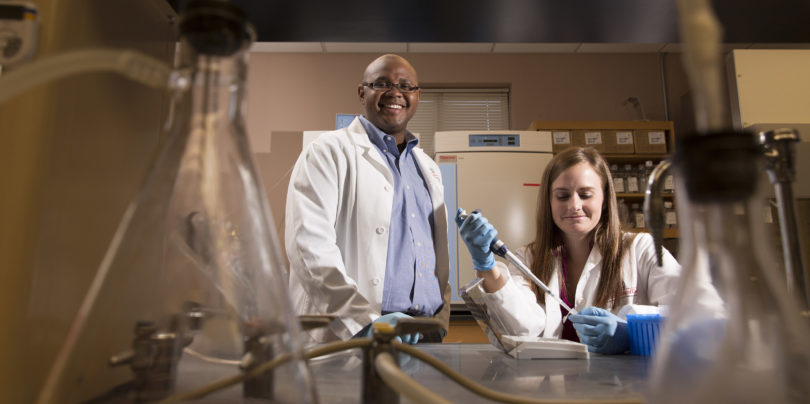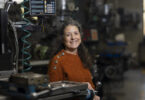Franklin West, an assistant professor in the animal and dairy science department, wants to help students recapture their love and enthusiasm for science.
Where did you earn degrees and what are your current responsibilities at UGA?
I earned my Bachelor of Science degree in biology at Morehouse College in Atlanta. I am a UGA Dawg for life as I got my Ph.D. here at UGA in the animal and dairy science department, and I am now an assistant professor in the same department. I am not sure how or why people would ever leave UGA.
When did you come to UGA and what brought you here?
I came to UGA to pursue a Ph.D. with an emphasis in stem cells to, one day, help patients who suffer from debilitating diseases and to save endangered animal species. An odd combination I know, but stem cells and cloning can help save humans and animals alike. Stem cells can be transplanted into patients who have suffered a stroke or traumatic brain injury and lead to regeneration of damaged tissue and recovery of lost sensory and motor function as well as cognitive abilities. By the same token, stem cells can be generated from endangered animal species and turned into sperm and eggs. This would preserve important genetics for the long term, and these cells could be used in breeding programs at zoological parks, nature preserves and animal sanctuaries across the world.
What are your favorite courses and why?
Is it cheating to say the class that I teach-ADSC 3130 “Animal Biotechnology”? I have more fun in that classroom teaching and interacting with students than almost anywhere else. The discussion of controversial topics like human cloning and stem cells always makes quite a stir and leads to in-depth discussions at the nexus of science, ethics, religion and politics. Most days, I educate the students, but every semester they teach me a few things as well.
What interests you about your field?
The component that I find most amazing about stem cells is their ability to regenerate damaged nervous system tissue and potentially help millions of people who suffer from neural injury and degenerative diseases. We have been studying the ability of stem cells to develop into neural stem cells and then cells of the central nervous system (e.g. neurons, astrocytes and oligodendrocytes) in petri dishes for years. The problem with petri-dish-only studies is the information that you get is limited to a very simple and controlled environment relative to what happens in real neural injury patients. We are now at the point of studying how stem cells function in stroke animal models, and what we are learning is amazing. These cells develop into a number of appropriate cell types, form new functional neural networks and significantly enhance recovery. It is truly amazing.
What are some highlights of your career at UGA?
One of the most exciting things that I have done so far is to develop pluripotent stem cells induced from pigs that were capable of generating chimeric animals. This exciting technology can help make animals that are more disease-resistant, environmentally friendly and more productive. The other advantage of this technology is that it can be used to make genetically engineered pigs for xenotransplantation (e.g. transplanting a pig heart into a human patient). At first glance this may seem like something no one would want to do. However, every year numerous people die because there are not enough donor organs. These people potentially could be saved by pig hearts, kidneys and livers. And why not? We already use pig heart valves in medicine.
How does your research or scholarship inspire your teaching, and vice versa?
I teach undergraduate and graduate courses in animal biotechnology and experimental methods in animal biotechnology, respectively. My courses are totally inspired by research. In the lab, we are always doing cutting-edge research, and I feel that by bringing in exciting new science we can show students how inspiring science can really be. In fact, we do not use a textbook in either of my courses. We use papers written by the original scientists in their own words. Then we dissect and discuss the findings, scientific concepts and explore how these ideas fit into the current scientific framework. I think this approach is much better than the “read a chapter, take the test” approach.
What do you hope students gain from their classroom experience with you?
Mostly I want to help students recapture their love and enthusiasm for science. There was a recent study that showed that more than 70 percent of elementary students love science, but by the time they make it to college less than 20 percent are truly interested in science. The question is why? I believe it is the way we teach science. The teacher has to cover the entire textbook as fast as possible, while the students have to rote memorize a bunch of facts and regurgitate them on a test. That is not the way science learning should be. I strongly believe that science should be taught in a manner where students can learn deeply about a subject and really understand what is going on and what it means in the big picture.
Describe your ideal student.
Students who come to class on time and ask lots of questions. LOL!
Favorite place to be/thing to do on campus is…
Besides my lab, my favorite place on campus is the Ramsey Student Center. I love the fact that they always have new and fun machines to work out on. I need all the motivation I can get to exercise.
Beyond the UGA campus, I like to…
I like to work on reef tanks, work in the yard (fruit trees and bushes are my new thing) and travel to exciting locations.
Favorite book/movie (and why)?
I am embarrassed to admit that my favorite books are the Harry Potter series and the Game of Thrones (Song of Ice and Fire) series. Yes, this is not exactly academic reading, but the writing is epic and the narratives and character development are out of this world. I think both series should be required reading.
Proudest moment at UGA?
My proudest moment at UGA was when I walked across the stage, shook then-President Michael Adams’ hand and received my Ph.D. after four and a half years of hard work … truly a labor of love.
Originally published on Aug. 17, 2014






